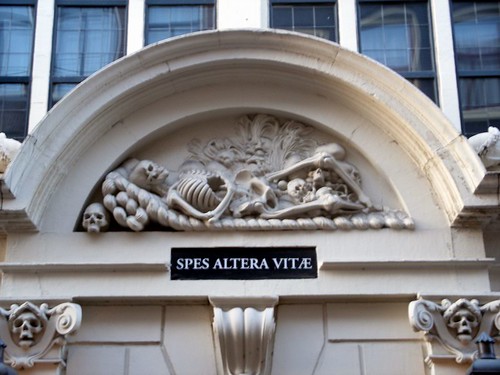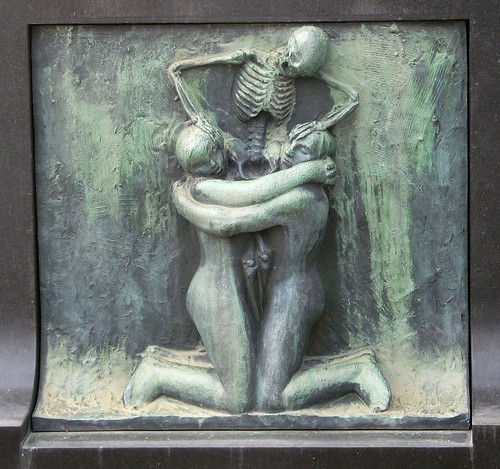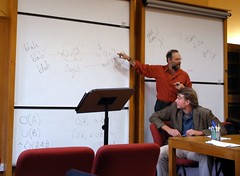 I recently came across the concept of “death positivity”, expressed as the idea that we should accept the inevitability of death and embrace the diversity of attitudes and customs surrounding it. Looking a bit deeper, I found the Order of the Good Death and their statement.
I recently came across the concept of “death positivity”, expressed as the idea that we should accept the inevitability of death and embrace the diversity of attitudes and customs surrounding it. Looking a bit deeper, I found the Order of the Good Death and their statement.
That got me thinking about transhumanist attitudes to death and how they are perceived.
While the brief Kotaku description makes it sound that death positivity is perhaps about celebrating death, the Order of the Good Death mainly is about acknowledging death and dying. That we hide it behind closed doors and avoid public discussion (or even thinking about it) is doing harm to society and arguably our own emotions. Fear and denial are not good approaches. Perhaps the best slogan-description is “Accepting that death itself is natural, but the death anxiety of modern culture is not.”
The Order aims at promoting more honest public discussion, curiosity, innovation and gatherings to discuss death-related topic. Much of this relates to the practices in the “death industry”, some of which definitely should be discussed in terms of economic costs, environmental impact, ethics and legal rights.
Denying death as a bad thing?
 There is an odd paradox here. Transhumanism is often described as death denying, and this description is not meant as a compliment in the public debate. Wanting to live forever is presented as immature, selfish or immoral. Yet we have an overall death denying society, so how can this be held to be bad?
There is an odd paradox here. Transhumanism is often described as death denying, and this description is not meant as a compliment in the public debate. Wanting to live forever is presented as immature, selfish or immoral. Yet we have an overall death denying society, so how can this be held to be bad?
Part of it is that the typical frame of the critique is from a “purveyor of wisdom” (a philosopher, a public intellectual, the local preacher) who no doubt might scold society too had not the transhumanist been a more convenient target.
This critique is rarely applied to established religions that are even more radically death denying – Christianity after all teaches the immortality of the soul, and in Hinduism and Buddhism ending the self is a nearly impossible struggle through countless reincarnations: talk about denying death! You rarely hear people asking how life could have a meaning if there is an ever-lasting hereafter. (In fact, some have like Tolstoy argued that it is only because such ever-lasting states that anything could have meaning). Some of the lack of critique is due to social capital: major religions hold much of it, transhumanism less, so criticising tends to focus on those groups that have less impact. Not just because the “purveyor of wisdom” fears a response but because they are themselves consciously or not embedded inside the norms and myths of these influential groups.
Another reason for criticising the immortalist position is death denial. Immortalism, and its more plausible sibling longevism, directly breaks the taboo against discussing death honestly. It questions core ideas about what human existence is like, and it by necessity delves into the processes of ageing and death. It tries to bring up uncomfortable subjects and does not accept the standard homilies about why life should be like it is, and why we need to accept it. This second reason actually makes transhumanism and death positivity unlikely allies.
Naïve transhumanists sometimes try to recruit people by offering the hope of immortality. Often they are surprised and shocked by the negative reactions. Leaving the appearance of a Faustian bargain aside, people typically respond by shoring up their conventional beliefs and defending their existential views. Few transhumanist ideas cause stronger reactions than life extension – I have lectured about starting new human species, uploading minds, remaking the universe, enhancing love, and many extreme topics, but I rarely get as negative comments as when discussing the feasibility and ethics of longevity.
The reason for this is in my opinion very much fear of death (with a hefty dose of status quo bias mixed in). As we grow up we have to handle our mortality and we build a defensive framework telling us how to handle it – typically by downplaying the problem of death by ignoring it, explaining or hoping via a religious framework, or finding some form of existential acceptance. But since most people rarely are exposed to dissenting views or alternatives they react very badly when this framework is challenged. This is where death positivity would be very useful.
Why strict immortalism is a non-starter
 Given our current scientific understanding death is unavoidable. The issue is not whether life extension is possible or not, just the basic properties of our universe. Given the accelerating expansion of the universe we can only gain access to a finite amount of material resources. Using these resources is subject to thermodynamic inefficiencies that cannot be avoided. Basically the third law of thermodynamics and Landauer’s principle imply that there is a finite number of information processing steps that can be undertaken in our future. Eventually the second law of thermodynamics wins (helped by proton decay and black hole evaporation) and nothing that can store information or perform the operations needed for any kind of life will remain. This means that no matter what strange means any being undertakes as far as we understand physics it will eventually dissolve.
Given our current scientific understanding death is unavoidable. The issue is not whether life extension is possible or not, just the basic properties of our universe. Given the accelerating expansion of the universe we can only gain access to a finite amount of material resources. Using these resources is subject to thermodynamic inefficiencies that cannot be avoided. Basically the third law of thermodynamics and Landauer’s principle imply that there is a finite number of information processing steps that can be undertaken in our future. Eventually the second law of thermodynamics wins (helped by proton decay and black hole evaporation) and nothing that can store information or perform the operations needed for any kind of life will remain. This means that no matter what strange means any being undertakes as far as we understand physics it will eventually dissolve.
One should also not discount plain bad luck: finite beings in a universe where quantum randomness happens will sooner or later be subjected to a life-ending coincidence.
The Heat Death of the Universe and Quantum Murphy’s Law are a very high upper bounds. They are important because they force any transhumanist who doesn’t want to dump rationality overboard and insist that the laws of physics must allow true immortality because it is desired to acknowledge that they will eventually die – perhaps aeons hence and in a vastly changed state, but at some point it will have happened (perhaps so subtly that nobody even noticed: shifts in identity also count).
To this the reasonable transhumanist responds with a shrug: we have more pressing mortality concerns today, when ageing, disease, accidents and existential risk are so likely that we can hardly expect to survive a century. We endlessly try to explain to interviewers that transhumanism is not really seeking capital “I” Immortality but merely indefinitely long lifespans, and actually we are interested in years of health and activity rather than just watching the clock tick as desiccated mummies. The point is, a reasonable transhumanistic view will be focused on getting more and better life.
Running from death or running towards life?
 One can strive to extend life because one is scared of drying – death as something deeply negative – or because life is worth living – remaining alive has a high value.
One can strive to extend life because one is scared of drying – death as something deeply negative – or because life is worth living – remaining alive has a high value.
But if one can never avoid having death at some point in one’s lifespan then the disvalue of death will always be present. It will not affect whether living one life is better than another.
An exception may be if one believes that the disvalue can be discounted by being delayed, but this merely affects the local situation in time: at any point one prefers the longest possible life, but the overall utility as seen from the outside when evaluating a life will always suffer the total disvalue.
I believe the death-apologist thinkers have made some good points about why death is not intensely negative (e.g. the Lucretian arguments). I do not think they are convincing in that it is a positive property of the world. If “death gives life meaning” then presumably divorce is what makes love meaningful. If it is a good thing that old people retire from positions of power, why not have mandatory retirement rather than the equivalent of random death-squads? In fact, defences of death as a positive tend to use remarkably weak reasons for motivations, reasons that would never be taken seriously if motivating complacency about a chronic or epidemic disease.
Life-affirming transhumanism on the other hand is not too worried about the inevitability of death. The question is rather how much and what kind of good life is possible. One can view it as a game of seeking to maximise a “score” of meaningfulness and value under risk. Some try to minimise the risk, others to get high points, still others want to figure the rules or structure their life projects to make a meaningful structure across time.
Ending the game properly
 This also includes ending life when it is no longer meaningful. Were one to regard death as extremely negative, then one should hang on even if there was nothing but pain and misery in the future. If death merely has zero value, then one can be in bad states where it is better to be dead than alive.
This also includes ending life when it is no longer meaningful. Were one to regard death as extremely negative, then one should hang on even if there was nothing but pain and misery in the future. If death merely has zero value, then one can be in bad states where it is better to be dead than alive.
As we have argued in a recent paper many of the anti-euthanasia arguments turn on their head when applied to cryonics: if one regards life as a too precious gift to be thrown away and that the honourable thing is to continue to struggle on, then undergoing cryothanasia (being cryonically suspended well before one would otherwise have died) when suffering a terminal disease in the rational hope that this improves ones chances clearly seems better than to not take the chance or allow disease to reduce one’s chances.
This also shows an important point where one kind of death positivity and transhumanism may part ways. One can frame accepting death as accept that death exists and deal with it. Another frame, equally compatible with the statement, is not struggling too much against it. The second frame is often what philosophers suggest as a means for equanimity. While possibly psychologically beneficial it clearly has limits: the person not going to the doctor with a treatable disease when they know it will develop into something untreatable (or not stepping out of the way of an approaching truck) is not just “not struggling” but being actively unreasonable. One can and should set some limit where struggle and interventions become unreasonable, but this is always going to be both individual and technology dependent. With modern medicine many previously lethal conditions (e.g. bacterial meningitis, many cancers) have become treatable to such an extent that it is not reasonable to avail oneself to treatment.
Transhumanism puts a greater value in longevity than is usual, partially because of its optimistic outlook (the future is likely to be good, technology is likely to advance), and this leads to a greater willingness to struggle on even when conventional wisdom says it is a good time to give up and become fatalistic. This is a reason transhumanists are far more OK with radical attempts to stave off death than most people, including cryonics.
Cryonics
 Cryonics is another surprisingly death-positive aspect of transhumanism. It forces you to confront your mortality head on, and it does not offer very strong reassurance. Quite the opposite: it requires planning for ones (hopefully temporary) demise, consider the various treatment/burial options, likely causes of death, and the risks and uncertainties involved in medicine. I have friends who seriously struggled with their dread of death when trying to sign up.
Cryonics is another surprisingly death-positive aspect of transhumanism. It forces you to confront your mortality head on, and it does not offer very strong reassurance. Quite the opposite: it requires planning for ones (hopefully temporary) demise, consider the various treatment/burial options, likely causes of death, and the risks and uncertainties involved in medicine. I have friends who seriously struggled with their dread of death when trying to sign up.
Talking about the cryonics choice with family is one of the hardest parts of the practice and has caused significant heartbreak, yet keeping silent and springing it as a surprise guarantees even more grief (and lawsuits). This is one area where better openness about death would be extremely helpful.
It is telling that members of the cryonics community seeks out each other, since it is one of the few environments where these things can be discussed openly and without stigma. It seems likely that the death-positive and the cryonics community have more in common than they might think.
Cryonics also has to deal with the bureaucracy and logistics of death, with the added complication that it aims at something slightly different than conventional burial. To a cryonicist the patients are still patients even when they have undergone cardiac arrest, are legally declared dead, solid and immersed in liquid nitrogen: they need care and protection since they may only be temporarily dead. Or deanimated, if we want to reserve “death” as a word for irreversibly non-living. (As a philosopher, I must say I find the cryosuspended state delightfully like a thought-experiment in a philosophy paper).
Final words
 I have argued that transhumanism should be death-positive, at least in the sense that discussing death and accepting its long-term inevitability is both healthy and realistic. Transhumanists will not generally support a positive value of death and will tend to react badly to that kind of statement. But assigning it a vastly negative value produces a timid outlook that is unlikely to work well with the other parts of the transhumanist idea complex. Rather, death is bad because life is good but that doesn’t mean we should not think about it.
I have argued that transhumanism should be death-positive, at least in the sense that discussing death and accepting its long-term inevitability is both healthy and realistic. Transhumanists will not generally support a positive value of death and will tend to react badly to that kind of statement. But assigning it a vastly negative value produces a timid outlook that is unlikely to work well with the other parts of the transhumanist idea complex. Rather, death is bad because life is good but that doesn’t mean we should not think about it.
Indeed, transhumanists may want to become better at talking about death. Respected and liked people who have been part of the movement for a long time have died and we are often awkward about how to handle it. Transhumanists need to handle grief too. Even if the subject may be only temporarily dead in a cryonic tank.
Conversely, transhumanism and cryonics may represent an interesting challenge for the death positive movement in that they certainly represent an unusual take on attitudes and customs towards death. Seeing death as an engineering problem is rather different from how most people see it. Questioning the human condition is risky when dealing with fragile situations. And were transhumanism to be successful in some of its aims there may be new and confusing forms of death.

